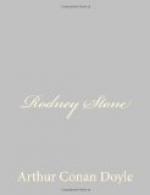Then I remember Mr. Paterson, the farmer, who was what you would now call a Radical, though at that time some called him a Priestley-ite, and some a Fox-ite, and nearly everybody a traitor. It certainly seemed to me at the time to be very wicked that a man should look glum when he heard of a British victory; and when they burned his straw image at the gate of his farm, Boy Jim and I were among those who lent a hand. But we were bound to confess that he was game, though he might be a traitor, for down he came, striding into the midst of us with his brown coat and his buckled shoes, and the fire beating upon his grim, schoolmaster face. My word, how he rated us, and how glad we were at last to sneak quietly away.
“You livers of a lie!” said he. “You and those like you have been preaching peace for nigh two thousand years, and cutting throats the whole time. If the money that is lost in taking French lives were spent in saving English ones, you would have more right to burn candles in your windows. Who are you that dare to come here to insult a law-abiding man?”
“We are the people of England!” cried young Master Ovington, the son of the Tory Squire.
“You! you horse-racing, cock-fighting ne’er-do-weel! Do you presume to talk for the people of England? They are a deep, strong, silent stream, and you are the scum, the bubbles, the poor, silly froth that floats upon the surface.”
We thought him very wicked then, but, looking back, I am not sure that we were not very wicked ourselves.
And then there were the smugglers! The Downs swarmed with them, for since there might be no lawful trade betwixt France and England, it had all to run in that channel. I have been up on St. John’s Common upon a dark night, and, lying among the bracken, I have seen as many as seventy mules and a man at the head of each go flitting past me as silently as trout in a stream. Not one of them but bore its two ankers of the right French cognac, or its bale of silk of Lyons and lace of Valenciennes. I knew Dan Scales, the head of them, and I knew Tom Hislop, the riding officer, and I remember the night they met.
“Do you fight, Dan?” asked Tom.
“Yes, Tom; thou must fight for it.”
On which Tom drew his pistol, and blew Dan’s brains out.
“It was a sad thing to do,” he said afterwards, “but I knew Dan was too good a man for me, for we tried it out before.”




